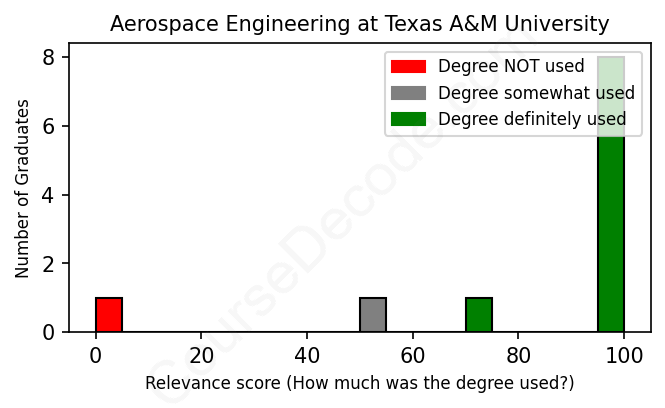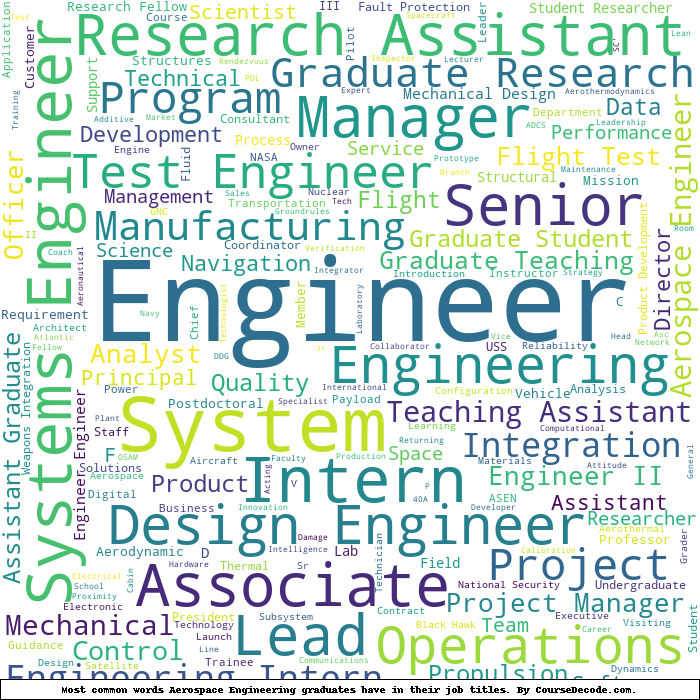
First, some facts. Of the Aerospace Engineering graduates from Texas A&M University we've analyzed , here's how many have used (or NOT used) their degree in their career:

These are estimates based on AI analysis of 11 LinkedIn profiles (see below).
The verdict? Significantly above average. Overall, with an average relevance score of 83%, Aerospace Engineering graduates from Texas A&M University have a much higher likelihood (+16%) of finding work in this field compared to the average graduate across all fields:
And for comparison, here's the chart for all profiles we've looked at across all degrees.
Also, after graduating, 45% of these graduates have pursued further education other than another Bachelor's degree (such as a Masters degree or other), compared to the average across all profiles of 35%. This suggests you may need more than just a Bachelors degree to be competitive as a Aerospace Engineering graduate.
See the details:
|
Relevance score: 98% We think this person has gone into a career highly relevant to their degree. We think this person has gone into a career highly relevant to their degree.
DEGREE INFOGraduated in 2016 from Texas A&M University with a Bachelor of Science in Aerospace Engineering. No other secondary education since. JOB HISTORY SINCE GRADUATIONStudent Learning Assistant South Texas College Sep 2016 - Nov 2016 Research Engineering / Scientist Associate III  University of Texas Center for Space Research Nov 2016 - Dec 2018 Engineering Scientist Associate  Applied Research Laboratories, The University of Texas at Austin Dec 2018 - Present ABOUTNo information provided. |
The top 10 most common jobs done by the graduates we've analyzed (ranked most common to least) are:
From the analysis of LinkedIn profiles of Aerospace Engineering graduates from Texas A&M University, it’s clear that many graduates have pursued careers directly related to their degree. Common roles include positions like Engineer roles at United Airlines, Navigation Engineer at VectorNav Technologies, and various engineering jobs at research institutions and aerospace companies. These jobs often involve applying core aerospace principles, particularly in areas such as aircraft systems design, reliability engineering, and space research. For instance, roles at United Airlines largely focus on aspects of aircraft engineering, which makes them highly relevant to their academic background.
However, not all positions are closely tied to aerospace engineering. Some graduates have taken on roles that seem to divert from their primary discipline, such as management or operational positions in unrelated industries, like the Houston Food Bank. Although some of these roles might incorporate general problem-solving skills learned during their education, they don’t consistently apply aerospace-specific knowledge. Overall, while there's a strong presence of relevant roles in the aerospace industry, there are also a notable number of positions that stray from core aerospace engineering, suggesting a mixed landscape of job relevance among graduates from Texas A&M University's Aerospace Engineering program.
Here is a visual representation of the most common words in job titles for Aerospace Engineering graduates (this is across all Aerospace Engineering graduates we've analyzed, not just those who went to Texas A&M University):

The graduates from Texas A&M University's Aerospace Engineering program have generally followed strong career trajectories that are relevant to their field. For many, the first job after graduation tends to be an entry-level engineering position, internships, or research roles that allow them to build practical experience. As seen in the profiles, several graduates have started their careers with internships at prestigious companies like United Airlines or the Air Force Research Laboratory, which often leads to full-time positions in engineering roles. Over the years, many have climbed the ranks within organizations, eventually landing senior positions or even moving into academia, like some of the graduates who became lecturers and professors.
About five to ten years down the line, many alumni are finding themselves in specialized engineering roles or leadership positions within reputable aerospace and defense companies. For instance, several graduates now hold titles like Senior Engineer or Principal Analyst at United Airlines or work with innovative companies like Anduril Industries and CACI International. This pattern shows that most graduates are able to stay within the aerospace sector or closely related fields, which suggests that a degree in Aerospace Engineering from Texas A&M sets students up for a successful career path. While there are a few exceptions where individuals have veered into non-related roles, the overall trend leans towards fulfilling careers in areas that directly apply their engineering skills. It's pretty clear that if you stick with this major, you're likely to find yourself doing meaningful work in aerospace or engineering-related fields!
Hey there! So, honestly, a Bachelor’s degree in Aerospace Engineering, including at Texas A&M University, is generally considered pretty challenging. You’ll dive into tough subjects like fluid mechanics, thermodynamics, and dynamics, and you'll probably find yourself spending a lot of late nights studying or working on projects. It can definitely feel intense with all the math and physics involved, plus the rigorous coursework and labs. But if you’re passionate about planes, rockets, or anything that flies, it can also be super rewarding. Just be prepared to put in a lot of effort and manage your time well, and you'll likely come out stronger for it!
Most commonly, in the LinkedIn profiles we've looked at, it takes people 4 years to finish a Bachelor degree in Aerospace Engineering.
From what I can see, it looks like these Aerospace Engineering grads from Texas A&M are doing pretty well for themselves! The range of jobs they’ve landed shows they’re seriously climbing the ladder—like the 2014 grad who's gone from intern to principal analyst at United Airlines; that’s some solid career progression! Even the more recent graduates are making their mark quickly, landing roles like Senior Flight Test Engineer or Mechanical Design Engineer shortly after finishing school. Positions like these usually come with decent salaries, especially in the aerospace sector. So yeah, it seems like they’re earning some respectable paychecks, which is pretty awesome for a field that’s all about innovation and tech!
Here is a visual representation of the most common words seen in the "about" section of LinkedIn profiles who have a Bachelor degree in Aerospace Engineering (this is across all Aerospace Engineering graduates we've analyzed, not just those who went to Texas A&M University). This may or may not be useful:

Here are all colleges offering a Bachelor degree in Aerospace Engineering (ordered by the average relevance score of their Aerospace Engineering graduates, best to worst) where we have analyzed at least 10 of their graduates:
| College | Score | Count |
|---|---|---|
 Texas A&M University Texas A&M University
|
83 | 11 |
 Georgia Institute of Technology Georgia Institute of Technology
|
82 | 16 |